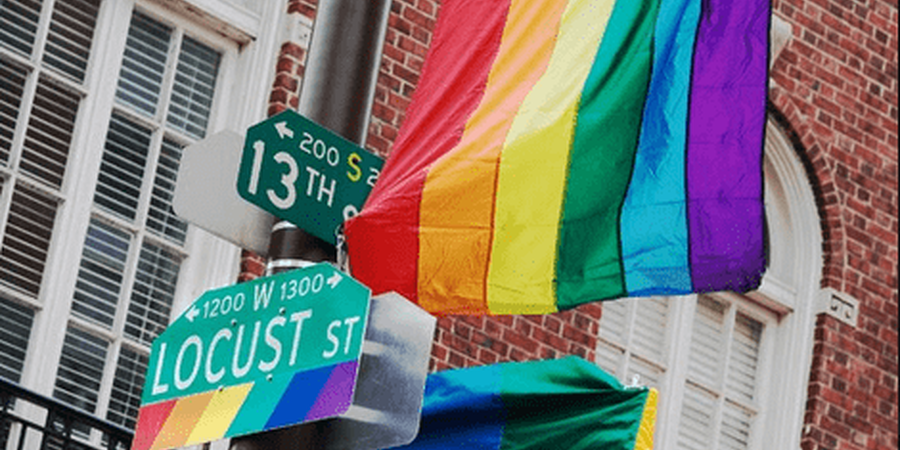Philadelphia, PA - The Philadelphia Gayborhood: The heart of Philadelphia’s gay community ever since World War II, the blocks along 11th Street and Broad Street, Pine Street, and Chestnut Street acquired its nickname—the “Gayborhood”—during an October Out-fest celebration in 1995. In 2007, Mayor John Street added 36 rainbow street marks around the neighborhood. Ever since the rainbows increased, more street signs (72 in all), properties, businesses, and crosswalks around 13th and Locust Streets have been decorated.
Tavern on Camac – From 1920 to 1960, the wood block-paved Camac Street between Walnut and Spruce Streets was referred to as “Philadelphia’s Greenwich Village.” Maxine’s, a speakeasy and musical bar, had been the heart of LGBTQ life around Camac. Nowadays (and for the past 20 years), Maxine’s is named Tavern on Camac, the city’s longest continuously running LGBTQ bar, still with the piano bar (singalongs are popular), weekend dancing, and a dinner-only restaurant. 243 S. Camac Street, (215) 545-0900, tavernoncamac.com
Visit The AIDS Library Historical Marker, established in 1987; this community library was the nation’s first dedicated library of information on HIV treatments, services, and resources. Currently, the Safe Center continues to provide referrals for regional and nationwide resources and free internet access for the public. It’s part of the Philadelphia FIGHT network of community health centers. 1233 Locust Street, 2nd floor (wheelchair accessible), (215) 985-4851, aidslibrary.org
Nightlife – Bar hopping rules the evening in the Gayborhood. Lively customers can be found engaging in singalongs at the piano bar Tavern on Camac, throwbacks a couple of libations at Writer’s Block Rehab, Toasted Walnut or Knock, flirting at dance club Voyeur, catch a queer show or two at Tabu, hanging with close friends and perhaps have a nosh at Franky Bradley’s, imbibing at beer spots (Boxers, Ubar) or socializing at mega-club, bar, and lounge Woody’s, a Gayborhood staple since 1980. Between 11th & 13th Streets and Pine & Chestnut Streets
Shopping – Independent stores have established their stakes in the community. Such as the clever handmade soaps and merchandise at Duross & Langel (which doubles as a men’s grooming lounge and salon), hip and Philly-centric finds from the gift shop Turney and Safran’s Open House and Verde, carefully curated Japanese housewares plus cosmetic merchandise from Rikumo, global jewelry at Bella Turka, original and vintage fine jewelry during Halloween and throwback Philly (and some other) sports team and fan gear at Mitchell & Ness and Shibe Vintage. Between 11th & Broad Streets and Pine & Chestnut Streets
William Way LGBT Community Center – The city’s LGBTQ community center occupied some rented spaces from 1976 to 1995 before settling into its home in 1996. William Way opens its doors 365 days a year, providing various programs, support services, events, and meeting spaces for the LGBTQ community. On the block-long western exterior wall of the building, artist Ann Northrup’s mural Pride & Progress depicts a tribute to Philadelphia’s LGBTQ history and culture. 1315 Spruce Street, (215) 732-2220, waygay40.org
Gayborhood Dining – 13th Street has grown to be the neighborhood’s eating place. Here, energetic businesswoman chef Marcie Turney and life plus business partner Valerie Safran grabbed an opportunity to open their first venture, Lolita, a fantastic romantic and innovative Mexican bistro—with excellent fresh-fruit margaritas. Nowadays, the duo manages and operates local Spanish destination Jamonera, all-American Bud & Marilyn’s, Italian trattoria Little Nonna’s, gourmet market Grocery, Mediterranean Barbuzzo, together with a pair of gift shops (see below), one particular chocolate-making studio, Marcie Blaine. However, that’s not all: The neighborhood is also home to Izakaya and coffee shop Double Knot, modern Asian Sampan, lounge-like upscale taqueria El Vez, elegant wine bar and ristorante Tredici Enoteca, stylish pizzeria Zavino, international stunner Maison 208 (with the city’s only retractable roof), chouquettes and eclairs at pristine bakeshop J’aime French Bakery and a few of the world’s very best gelato at Capogiro. 13th Street between Locust & Chestnut Streets
Philly AIDS Thrift @ Giovanni’s Room – The country’s longest-running LGBTQ bookstore was established along South Street in 1973 and moved 1979 to its current Pine Street location. The unofficial community and cultural center is named after James Baldwin’s trailblazing novel and is currently operated by Philly AIDS Thrift, a nonprofit secondhand shop at 710 S. 5th Street. Profits from the two stores go to individuals living with HIV & AIDS. A state historical marker is located outside the corner shop. 345 S. 12th Street, (215) 923-2960, phillyaidsthriftatgiovannisroom.com
John Fryer Historical Marker – This new Pennsylvania Historical Society marker recognizes the deceased activist John Fryer, M.D. In 1965, the University of Pennsylvania expelled Fryer from his psychiatric residency program based on his homosexuality, then deemed a mental illness by the American Psychological Association (APA) in 1952. In 1972, Fryer, a faculty member at the Temple University School of Medicine, provided an impressive anonymous testimony that resulted in the APA’s 1973 declassification of homosexuality as a mental illness.13th & Locust Streets, phmc.pa.gov
Gloria Casarez Mural – The now-shuttered 12th Street Gym, long the neighborhood’s de facto official athletic center, bears artist Michelle Angela Ortiz’s portrait of the late Gloria Casarez, the City of Philadelphia’s first director of the Office of LGBTQ Affairs, founding member of the Philly Dyke March, longtime community activist and Philadelphia native. A City Council resolution renamed the block where A Tribute to Gloria Casarez stands “Gloria Casarez Way.” During her time in City Hall, Casarez helped ensure Philadelphia adopted the nation’s broadest possible LGBTQ-rights protection. 204 S. 12th Street, muralarts.org


